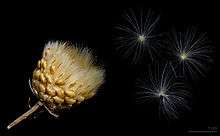Rhaponticum
| Rhaponticum | |
|---|---|
| | |
| Rhaponticum scariosum | |
| Scientific classification | |
| Kingdom: | Plantae |
| (unranked): | Angiosperms |
| (unranked): | Eudicots |
| (unranked): | Asterids |
| Order: | Asterales |
| Family: | Asteraceae |
| Tribe: | Cynareae [1] |
| Genus: | Rhaponticum Vaill. 1754 not Ludw. 1757 nor Adans. 1763 nor Haller 1742[1] |
| Synonyms[1] | |
| |

Rhaponticum a.k.a. Maral Root is a genus of plants in the thistle tribe within the sunflower family.[2][3]
Description
Rhaponticum species are perennial herbaceous plants with simple, rarely branched stems. The leaves are simple to pinnatifid. The inflorescence is on the apex of the stem. The fruit is an achene with a hairy pappus.[4]
Traditional Medicinal use
Maral root used in folk medicine for:
- To increase physical and mental stress. - To strengthen the efficiency of body. - To restore vigor. - To reduce feelings of fatigue, irritability. - To increase libido and potency (due to the high content of ekdistena).
"Maral root" can be used for athletes preparing for a competition, because:
- Increases the amplitude of the pulsation of the heart. - Expands peripheral blood vessels and increases blood flow velocity. - Displays the lactic acid from the muscle. - Improves endurance exercise capacity, reduces the feeling of fatigue.
List of species
- Rhaponticum acaule (L.) DC. - Morocco, Algeria, Tunisia, Libya
- Rhaponticum aulieatense Iljin - Kazakhstan, Uzbekistan, Tajikistan, Kyrgyzstan
- Rhaponticum australe (Gaudich.) - Austral cornflower, native thistle - Queensland, Victoria
- Rhaponticum berardioides (Batt.) Dobignard - Morocco
- Rhaponticum canariense DC. - Canary Islands
- Rhaponticum carthamoides (Willd.) Iljin - maral root - Kazakhstan, Mongolia, Xinjiang, Russia (Altai Krai, Chita, Irkutsk)
- Rhaponticum centauroides (L.) O.Bolòs - France, Spain
- Rhaponticum coniferum (L.) Greuter - Spain, Portugal, France, Italy, Algeria, Morocco, Tunisia
- Rhaponticum cossonianum (Ball) Greuter - Morocco
- Rhaponticum exaltatum (Willk.) Greuter - Spain, Portugal, Morocco
- Rhaponticum heleniifolium Godr. & Gren. - Austria, Switzerland, France, Italy
- Rhaponticum hierroi (Eren.) Kangay - Turkey
- Rhaponticum insigne (Boiss.) Wagenitz - Iran, Turkey
- Rhaponticum integrifolium C.Winkl. - Kazakhstan, Uzbekistan, Tajikistan, Kyrgyzstan
- Rhaponticum karatavicum Iljin - Uzbekistan, Tajikistan, Kyrgyzstan
- Rhaponticum longifolium (Hoffmanns. & Link) Dittrich - Morocco
- Rhaponticum lyratum C.Winkl. ex Iljin - Kazakhstan, Uzbekistan, Tajikistan, Kyrgyzstan
- Rhaponticum namanganicum Iljin - Kazakhstan, Uzbekistan, Tajikistan, Kyrgyzstan
- Rhaponticum nanum Lipsky - Kazakhstan, Uzbekistan, Tajikistan, Kyrgyzstan, Afghanistan
- Rhaponticum nitidum Fisch. - Kazakhstan, Uzbekistan, Altai Krai
- Rhaponticum orientale (Serg.) Peshkova
- Rhaponticum pulchrum Fisch. & C.A.Mey. - Azerbaijan, Republic of Georgia, Iran, Afghanistan
- Rhaponticum repens (L.) Hidalgo - Russian knapweed, creeping knapweed, hardheads, blueweed - Central Asia; naturalized in Europe, southwest Asia, Australia, North America
- Rhaponticum scariosum Lam. - France, Italy, Switzerland, Slovenia
- Rhaponticum serratuloides (Georgi) Bobrov - Baltic States, Belarus, Ukraine, Romania, European Russia, Moldova, Altai Krai, Turkey, Kazakhstan
- Formerly included[1]
Several species are now relegated to other genera: Centaurea, Klasea, Ochrocephala, Stemmacantha, and Synurus.
References
- 1 2 3 4 5 Flann, C (ed) 2009+ Global Compositae Checklist
- ↑ Vaillant, Sébastien. 1754. Der Konigliche Akademie der Wissenschaften in Paris Physische Abhandlungen 5: 177
- ↑ Tropicos, Rhaponticum Vaill.
- ↑ Rhaponticum. Flora of China.
- ↑ Hidalgo, O., et al. (2006). Phylogeny of Rhaponticum (Asteraceae, Cardueae–Centaureinae) and related genera inferred from nuclear and chloroplast DNA sequence data: taxonomic and biogeographic implications. Annals of Botany 97(5), 705-14.
- ↑ "Rhaponticum". National Center for Biotechnology Information (NCBI).
- ↑ GRIN Species Records of Rhaponticum. Germplasm Resources Information Network (GRIN).